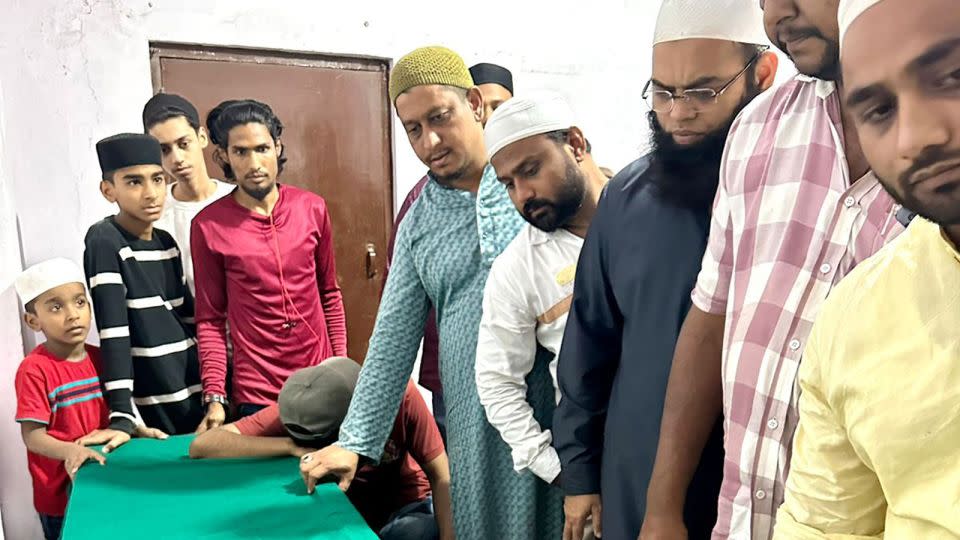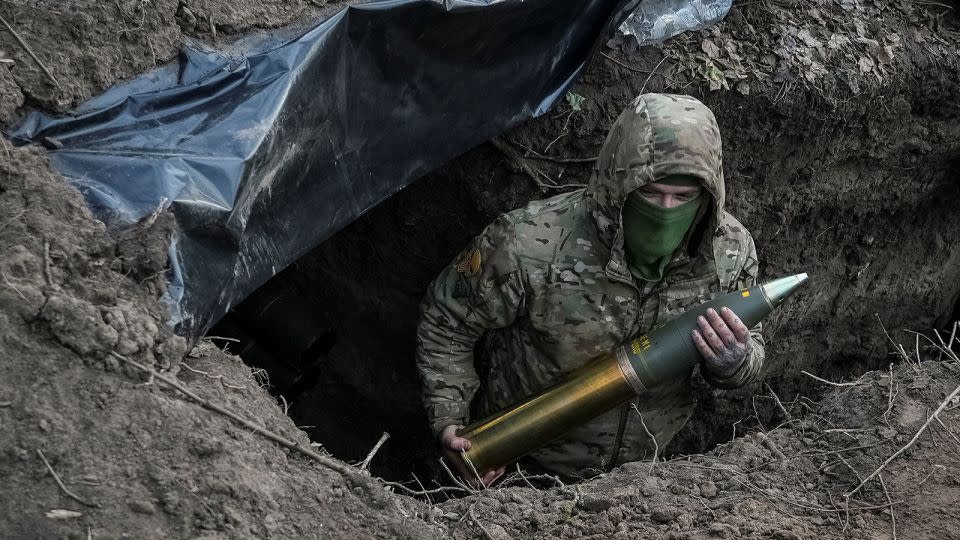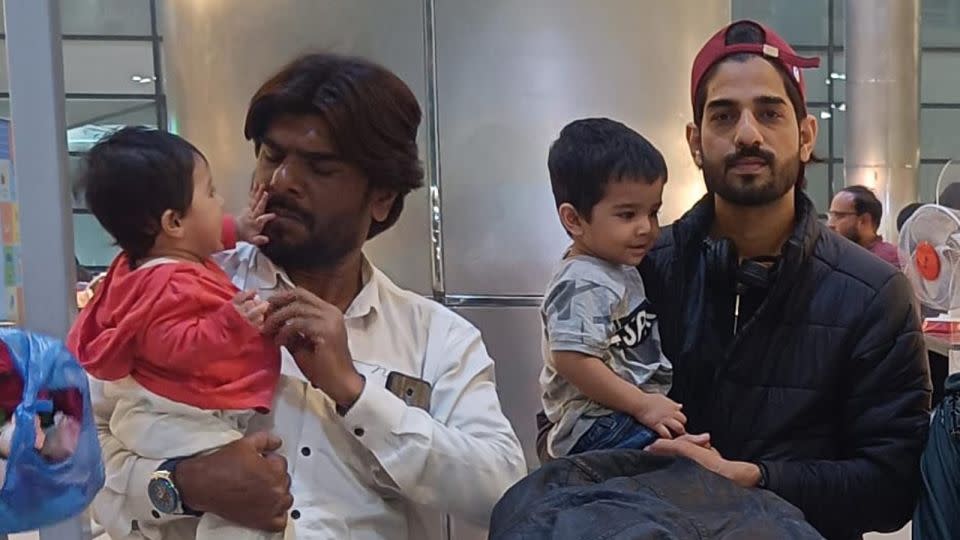They opened the box on a Sunday in late March, seeing Asfan Mohammed for the first time since he left India for Russia four months earlier.
He was better dressed than when he left – a black suit, white shirt, tie and shoes replacing the casual attire he wore when family and friends said goodbye to him.
But he had to be buried in accordance with his Muslim beliefs, so his body would have to be prepared; the clean clothes were removed.
It was then that Imran Mohammad, 41, saw the full extent of what happened to his 31-year-old brother while fighting for the Russian military in Vladimir Putininvasion of Ukraine.
“I saw holes in the back of the shoulder, from the ribs to the lower back,” Imran told CNN.
“There were six to seven holes caused by a drone strike. He tore her body apart. There was internal damage. Two teeth were broken.”
And now this close-knit family in Hyderabad, southern India, was also broken. A husband, father and provider gone.
Imran’s business was also in shambles, rotten by neglect, as he focused all his energies on finding out what happened to his brother on the battlefield of Europe’s bloodiest conflict since the Second World War.
Imran noted the time.
“I opened the box at 11am on Sunday. When I saw his body for the first time, I realized he no longer existed,” he said.
“My efforts to search for my brother, my two-month fight for my brother, have come to a painful end. I wanted to react by looking at his dead body, but I just couldn’t. I was completely numb.
A lost dream
Asfan met an unlikely fate – a fate his family could never have imagined when Putin ordered Russian troops into Ukraine in February 2022.
At the time, the father of two was running a clothing store, one of nearly 300 across India owned by local chain Allen Solly, which sold children’s clothes, wedding tuxedos and just about everything else.
He had been there eight years, his brother said.
It wasn’t the worst job, but Asfan wanted more for his wife and two children, aged 2 and 8 months. And he dreamed of getting them out of Hyderabad.
“He wanted to work in Australia,” where his sister-in-law and her family lived, Imran said. “They were calling him and his family there.”
But that meant Asfan would need to score high on the International English Language Testing System (IELTS), which assesses the proficiency of non-native speakers.
“He wrote his IELTS. He didn’t do well,” said Imran. “He felt unmotivated. He tried again.”
It didn’t work, Imran said.

But YouTube videos about job opportunities in Russia gave Asfan new hope, and he contacted an employment agency, his brother said.
“He was going to work as a taxi driver or delivery boy in Russia – that process was ongoing,” Imran said.
“Then, a few days later, the agents said there were openings for adjutant and security jobs in the Russian army. The agents assured him that this was the best job. They said he could get a Russian passport and national card within a year, during which time you could move around neighboring countries.”
Asfan thought it could be a stepping stone to his family’s dream life in Australia, his brother said.
Instead, his choice took him to the frigid, battle-scarred landscape of Ukraine.
Brainwash
Asfan kept his plans a secret from family and friends until it was too late to back out, according to Imran, who said he only learned his brother was leaving three days before he left for Russia on November 9 this year. past.
By that time, Asfan had paid more than $1,800 to recruiters, who asked him not to speak to anyone, not even his family, about his intention to travel.
“They brainwashed him so much… They warned him that he could be deported from Russia, from the airport,” Imran said. “I tried my best to stop him.”
After a journey with several stops that took him through other Indian cities and the United Arab Emirates, Asfan arrived in Moscow on November 12th.
A day later, he signed papers — in Russian, which he couldn’t read — committing him to the job, his brother said.
“He trusted the agents too much,” Imran said.


Foreign fighters in Putin’s war
By some estimates, Russia has sent thousands of foreign men to fight in Ukraine since Putin ordered the invasion.
Many of them are young people from South Asia, attracted by the prospect of stable employment and higher wages in Russia. In Nepal, prominent opposition lawmaker and former foreign minister Bimala Rai Paudyal told parliament earlier this year that between 14,000 and 15,000 Nepalis fought on the front lineciting testimonies from men who returned from Ukraine.
The Russian government last year announced a lucrative package for foreign fighters to join the country’s military, including a monthly salary of at least $2,000 and a fast-track to Russian citizenship – but the Kremlin has not said how many foreigners it has recruited under the plan. .
New Delhi has strong ties with Moscow dating back to the Cold War and has avoided openly condemning the invasion by Russia, which remains India’s biggest arms supplier.
India has also become a major buyer of Russian energybolstering Moscow’s coffers with a record $37 billion in crude oil purchases last year alone and enabling Russia’s sanctions to hit the economy with vital revenue.
Meanwhile, India, which has no law preventing its citizens from serving in the armed forces of a foreign state, has acknowledged that several of its citizens have fought for Russia in Ukraine.
In a statement in February, the Indian Ministry of External Affairs said that getting these Indians an early discharge from the Russian military was a “top priority.” The ministry told CNN last month that it has been in continuous contact with Russian authorities to make this happen.
But for some, these efforts would come too late. A ministry spokesperson told CNN that at least two Indians died in the conflict.
In early March, India’s Central Bureau of Investigation (CBI) said it had dismantled large human trafficking networks that tricked men into Russian military jobs, and 35 such cases had been identified.
“The trafficked Indian nationals were trained in combat roles and posted at frontline bases in the Russia-Ukraine war zone against their will,” the CBI statement said.
To the front line
Asfan did not tell his brother when he would be sent to Ukraine, Imran said, but got in touch on December 1 as he headed to the battlefield.
Asfan was looking for a way out, Imran said.
“He asked me to speak to the agents,” Imran said. “I promised him I would do my best.”
It was the last time they spoke.
“The military had no contact with these agents,” Imran said.
“These brokers cheated the boys and put their lives in danger,” he said, referring to Asfan and other Indians sent to war.
Weeks of uncertainty, then disbelief
On January 23, Imran received a voicemail from one of the Indian men deployed alongside Asfan.
The man, who said he was injured in combat, told Imran that he found Asfan, who had also been injured, inside a house in Ukraine a day earlier.
Imran said the man told him he could not pick up his brother “because of the drones around him” but reported Asfan’s condition to a Russian medical team.
Ukrainian forces have used converted commercial drones against their Russian opponents, with devastating effects on the front lines, whether by dropping grenades from above or using them as remotely controlled bombs.
Two days later, Imran said he visited his member of parliament to try to get Indian authorities to help his injured brother. But appeals to the government went unanswered, he said.
The Indian Embassy in Moscow eventually responded that it was investigating the case.
On a March 6 visit to his deputy’s office, Imran received the news he feared.


“We called the emergency number of the Indian Embassy (in Moscow). As soon as I mentioned Asfan’s name on the phone, I was told he was dead. I didn’t have the strength to talk to them,” he said.
“I didn’t want to believe what they were saying.”
He still had no visual proof of Asfan’s death, but he had to convey what he discovered to the rest of the family.
Asfan’s wife “was unconscious for three hours,” Imran said. “She cried all night.”
Asfan’s family buried his body, but it is scarred by a distant war.
Imran says it pains him to look at his brother’s young children, who will never know their father. And he says his own future seems uncertain.
“This has been going on for four months, 24 hours a day,” he said. “This was the worst phase I have ever been through. There is no more personal life. There were no friendships left. I just take care of my family.”
And one of them, his brother, disappeared forever.
For more news and newsletters from CNN, create an account at CNN.com




































